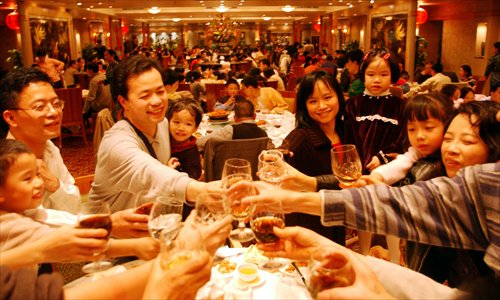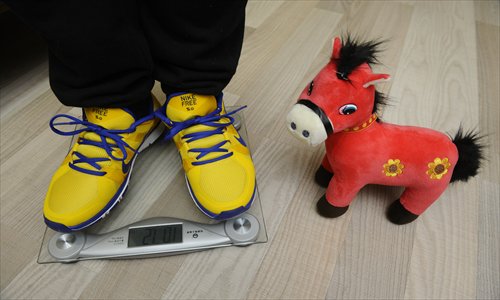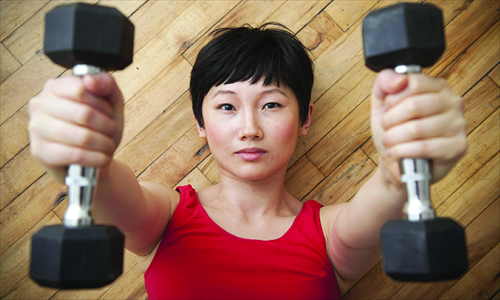Holiday hangover

Losing those extra kilograms gained over Spring Festival presents an early challenge for people whose resolution is to get fit in 2014. Photo: Li Hao/GT
Zhang Ning always dreads stepping on the scales after Spring Festival, a gluttonous week that demands devouring countless servings of dumplings, fatty pork gristle and niangao (sticky brown New Year cake) in the name of family reunion. When Zhang weighed himself this week, he was alarmed to find he had gained five kilograms to weigh in at 82.5 kilograms.
Zhang, who is 27 and 1.79 meters tall, blamed his weight gain on overeating during an exercise-free Spring Festival.
"I had no time to hit the gym. I need to exercise more now to get down to my ideal weight of 75 kilograms," he said.
Zhang's experience reflects the popular Chinese adage that "every holiday you gain five kilograms."
Although many people disregard the tongue-in-cheek phrase, for some it is an ominous warning of a nightmare that strikes every lunar year.
A 58-year-old woman in Nanjing, Jiangsu Province, found out just how dangerous excessive eating and drinking over Spring Festival can be when her stomach exploded following severe abdominal swelling, news portal Modern Express reported on February 8.
For those who just have to worry about their stomachs expanding rather than exploding over the holiday, nutritionists and health experts have sage advice to quickly and safely lose that Spring Festival flab.

Spring Festival banquets are a time of family reunion combined with a calorie overload. Photo: CFP
Let's get physical
Nutritionist Yang Wenjiao dispelled the myth that the post-holiday bulge is easy to lose because it is just bloat from excessive food.
"If people exercise the day after they eat too much, it can be easy to burn fat. But after a week-long eating and drinking binge like Spring Festival, food has already been digested and converted into fat," said Yang, who said the only exception to this rule is constipation.
Jia Wei, a fitness instructor at Beijing weight-loss company Slim, told Metropolitan that it is better to work out five days a week for one-and-a-half hours each time to lose those unwanted holiday kilos.
"Each workout should be divided into two parts. The first 30 to 50 minutes should involve aerobic exercises, while remaining time should be devoted to building muscle," noted Jia, who said such a regimen accompanied by good diet can shed around three kilograms after a month.
Zhang said rather than dieting he prefers to work out to lose his flab. Unable to resist the temptation of delicious foods, Zhang has seen his weight fluctuate over the past two years.
"I once lost two kilograms in three weeks through exercising, but my problem is that I can't persist. My workout regimen is often interrupted by business trips, injuries and holidays. It's so easy to put on weight when I'm not going to the gym," said Zhang, who works in human resources.
Concerned by a trend known in Chinese as "the lazy person's guide to losing weight" that is built around the principle of burning calories through low-intensity workouts, personal trainer Chen Lijuan from Impulse Fitness said such fads are "nothing but lies."
One of the "lazy-person" workouts involves getting on all fours to arch your back like a stretching cat a dozen times each day.
"You can't depend on any workout that requires minimal energy. A high-intensity, hour-long workout is a guaranteed way to lose weight," said Chen. "But exercise needs to be supplemented by a low-calorie intake for the best results."

Feeling so hungry you could eat a horse? A look at the scales after Spring Festival might give you second thoughts. Photo: Li Hao/GT
Choosing the right diet
Spring Festival presents day after day of calorie consumption. People in North China traditionally eat dumplings (218cal/100g), while in the country's south sticky rice balls (213cal/100g) are more common. Other foods popular during the holiday include pork (143cal/100g), chicken (167cal/100g) and fish (113cal/100g). Yang stressed that losing weight by crash dieting is a short-term fix that isn't conducive to good health.
"Unless you're willing to diet for a long time so that you can gradually lose fat, [crash dieting] can cause more harm than help. When you diet, your body relies on sugar stored in the liver to function, followed by protein in the muscles and finally fat," said Yang.
University student Ji Xiang, 21, managed to shed more than 25 kilograms by dieting over the past year. He currently weighs a slender 61 kilograms, and is determined to keep his newfound body figure.
"When I began dieting, I woke up at midnight every night for a month with agonizing hunger pangs. But after I endured that period, food was no longer the temptation it had been to me in past," said Ji.
Ji's diet, which was devised by his friend's sister who operates a gym, consists mainly of grains, vegetables and meat except pork. He only eats dinner until he feels half-full.
"I've resorted to exercise now as my main method to stay fit, but I still eat little at dinner," Ji said.
Yang suggests that people who eat too much meat during Spring Festival should avoid it for two or three days after the holiday is over.
"If you want to lose weight, eating until you're about three-quarters full at lunch and dinner is ideal. It's better to eat grains, cereal and mushrooms. Sweet fruits should be limited," said Yang.

Workout routines should include a balance of aerobic and muscle-building exercises. Photo: IC
Bitter pill to swallow
For those seeking a fast way to slim down, there is an abundance of diet pills that promise rapid results. But pharmacist Li Yili warned diet pills are a "life-endangering" fad to be avoided by most people.
"Diet pills on the market mainly work by suppressing appetite, increasing water discharge, boosting gastric motility and accelerating excretion," noted Li, who warned the pills can lead to eating disorders like anorexia and cause fatigue, lethargy and overeating.
"Some pills can cause insomnia, emotional instability, hallucinations and depression. Cases of bulimia and vomiting from anxiety have been reported from long-term use of diet pills," added Li, who said he once encountered a 1.64-meter-tall girl whose use of diet pills caused her weight to drop to 17.5 kilograms.
Li noted that people under 18 or over 70, women who are pregnant or planning to become pregnant and people with heart or lung diseases should avoid diet pills.
"But if you're more than 30 percent heavier than your ideal weight, diet pills can be safely taken if approved by a doctor and complemented by exercise," said Li.
Chen Zhikun, a nutritionist with the Beijing Nutritionist Club, has called for certain recipes of Spring Festival foods to be modified to limit post-holiday weight gain.
"It's important to consume 500 grams of vegetables, 250 grams of fruit and 150 grams of grains daily," said Chen, adding that his family has substituted traditional yet fatty ingredients like pork oil for healthier peanut and vegetable oils.
"In the past, most Chinese only had good food to eat during Spring Festival, so they would naturally gorge. We regularly eat fish and meat nowadays, yet still insist on overeating during the holiday," Chen said.
Li Lin and Tang Liyue contributed to this story